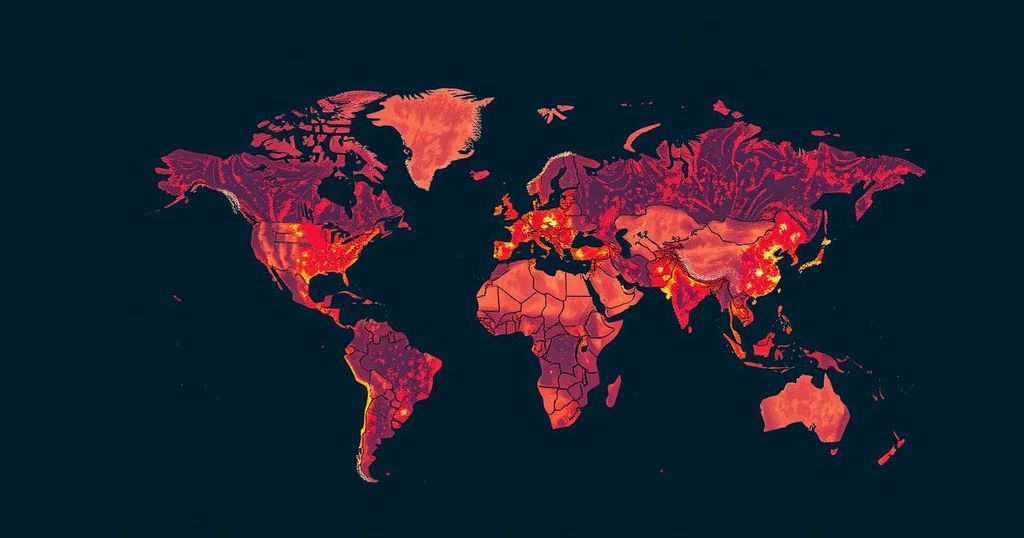Rising Heat-Related Deaths and Diseases Due to Climate Change: A Call for Action

A report by the Lancet Countdown reveals that climate change is driving a significant increase in heat-related deaths and diseases, with the average person experiencing 50 additional days of dangerous temperatures in 2023. With 10 out of 15 tracked indicators reaching concerning levels, the report highlights the vulnerability of the elderly, economic losses in labor productivity, and increased food insecurity. Experts call for urgent policy changes and funding directed towards public health in light of these findings.
A recent report by the Lancet Countdown highlights the alarming rise in heat-related deaths and diseases as a direct consequence of climate change, with 2023 being noted as the hottest year on record. This climate crisis has led to the average individual experiencing an additional 50 days of hazardous temperatures annually. The ongoing extreme heat has escalated the severity of health risks, particularly for vulnerable populations such as the elderly, who have seen heat-related fatalities increase by 167 percent compared to the 1990s. The report emphasizes the urgent need for action, indicating that if current policies persist, the world may face a temperature increase of 2.7 degrees Celsius by 2100. Furthermore, the economic ramifications are significant, as extreme heat is estimated to have resulted in a staggering loss of 512 billion potential labor hours. Compounding these issues is the reality that climate change is exacerbating food insecurity, with nearly half of the world’s land experiencing extreme drought and flooding, which also heightens the risk of waterborne diseases. The authors call for funding directed towards public health initiatives at the forthcoming COP29 summit, while also recognizing some progress in reducing fossil fuel-related air pollution and increasing the use of renewable energy. The growing crisis of heat-related health impacts has been documented in a new report that brings together insights from 122 experts, including those from the World Health Organization (WHO). The stark statistics indicate not only a worsening of physical health outcomes but also a decline in economic productivity linked to extreme weather events. The report attributes part of the ongoing climate crisis to decisions made by oil and gas companies, which continue to prioritize fossil fuel production amidst rising global temperatures. In light of the critical data presented, experts stress the need for comprehensive policy reforms to mitigate these impacts and safeguard public health, particularly as the climate summit approaches. As the global community grapples with these challenges, it is imperative to adopt a multifaceted response that addresses both the environmental and health consequences of climate change. The Lancet Countdown report serves as a compelling reminder of the urgent need for coordinated action to protect vulnerable populations and promote sustainable practices globally.
The report from the Lancet Countdown provides an annual assessment of the health impacts of climate change, drawing upon a wide array of scientific findings. It brings to light the direct relationship between rising global temperatures and adverse health outcomes, including increased mortality rates, the proliferation of diseases associated with heat exposure, and the economic costs incurred by loss of labor productivity. By analyzing several indicators, the report underscores the ongoing trend of climate change exacerbating health disparities, particularly affecting the elderly and those in food-insecure environments. This context lays a crucial foundation for understanding how climate policies and health initiatives interconnect.
In conclusion, the Lancet Countdown report elucidates the dangerous trajectory of heat-related health issues prompted by climate change, emphasizing the urgent need for action at both the policy and individual levels. As nations prepare for COP29, the report highlights the critical importance of prioritizing public health in climate strategies. While there are signs of progress in reducing certain pollution levels and increasing renewable energy use, the growing vulnerability of populations and the economic toll of climate-related health impacts necessitate immediate and comprehensive initiatives to combat this crisis.
Original Source: www.aljazeera.com






